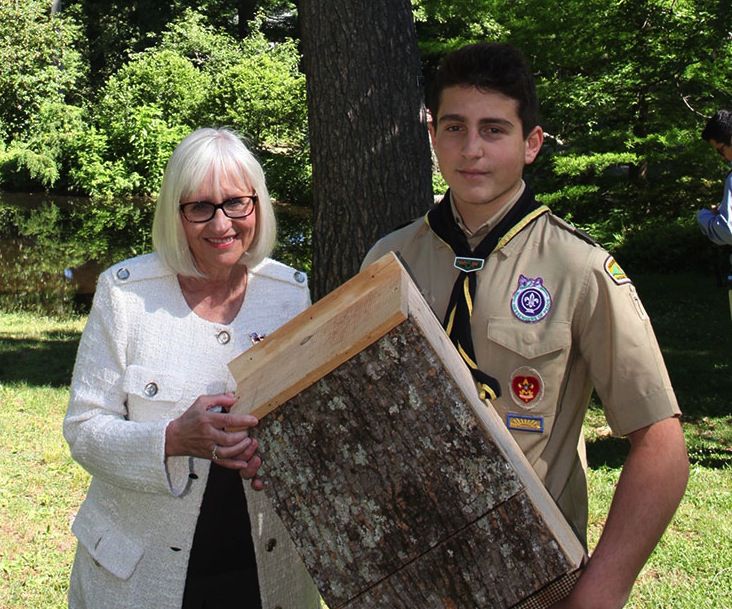The Town of North Hempstead is combating disease-carrying mosquitoes by installing bat boxes in parks throughout the town.
North Hempstead Supervisor Judi Bosworth and Manhasset Boy Scouts helped in the effort, which aims to reduce the population of mosquitoes in an environmentally friendly way.
The Zika virus is one of many diseases carried by mosquitoes worldwide, and so far about 300 cases of Zika infection have been reported in New York City and Long Island, with 16 cases in Nassau County, according to the office of Senator Charles Schumer.
These cases were believed to have been contracted outside the New York region. Zika outbreaks have been reported in many countries and in Puerto Rico and the U.S. Virgin Islands, but no local mosquito-borne transmission of Zika has been found in any of the 50 states so far, according to the federal Centers for Disease Control and Prevention.
“In the Town of North Hempstead we are trying to promote alternative methods to control pesky … insects, such as mosquitoes, which are carriers of West Nile virus among other diseases,” Bosworth said. “Pesticide use kills beneficial insects, birds and other life, as well as the insects they target, and poisons our environment. Bat boxes provide an ecologically safe approach to controlling mosquitoes and other pests in our parks.”
Eric Powers, a town parks ranger who hosts North Hempstead TV’s nature program “Off the Trail,” lent his expertise to the project.
“We know that it works because of the myriad of trials around the country where these boxes are in place and bats are busy eating their way through the bugs,” Powers said. “We must create the opportunity for the bats to live and exist so that they can eat their way through the mosquito population.”
While bats are known for making their home in caves, during the summer they typically live in trees, according to the National Wildlife Federation.
The bat boxes are designed to mimic the environment of the space between the bark and trunk of a tree.
The wildlife federation and many other environmental organizations provide instructions on how to make a bat box as a do-it-yourself project.
A Manhasset teen, Yianni Biniaris, learned how to make bat boxes as a part of his Eagle Scout project for Troop 71, and is helping the town’s Parks and Recreation Department to combat pests, according to a Town of North Hempstead news release. Biniaris met with Supervisor Bosworth and brought one of his self-made bat boxes. Biniaris is focusing on still waters and small streams where mosquitoes tend to congregate, like Leeds Pond, Plandome Pond and Harbor Links Golf Course.
Kevin Braun, the town’s environmental control specialist, who is also a proponent of the bat houses, said, “The effectiveness is hard to quantify, but we know that bats eat flying insects, including mosquitoes, so it is not a great leap of faith to say that more bat boxes means more bats and less mosquitoes.”
The town currently has bat boxes at Manorhaven Beach Park, Harbor Links Golf Course, Clark Botanic Garden, Plandome Pond Park, Whitney Pond Park and the Hempstead Harbor Trail, and plans to add more with the help of Biniaris and other Boy Scouts who are building bat boxes for their Eagle Scout projects.
Other state parks use bat boxes, including Hither Hills in Montauk, where they are located outside the bathroom due to the lights that attract insects at night, Braun said.
The Town of North Hempstead also uses essential oils, like rosemary, citronella and insecticidal soaps to spray for pests.
For more information on the town’s pest-control efforts, residents can call 311.



